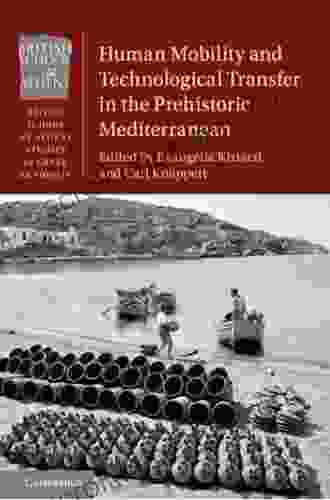Human Mobility and Technological Transfer in the Prehistoric Mediterranean: Unveiling the Interconnections of Ancient Civilizations

The Mediterranean Sea, a vast expanse of water that has shaped the course of human history, served as a cradle of civilization for millennia. From the fertile shores of Egypt to the vibrant cities of Greece, the Mediterranean region witnessed the rise and fall of countless civilizations, each leaving behind a legacy that continues to fascinate us today.
5 out of 5
| Language | : | English |
| File size | : | 3534 KB |
| Text-to-Speech | : | Enabled |
| Screen Reader | : | Supported |
| Enhanced typesetting | : | Enabled |
| Print length | : | 288 pages |
One of the most intriguing aspects of prehistoric Mediterranean societies was their interconnectedness. People, ideas, and technologies traveled across the sea, forging bonds between distant cultures and contributing to the development of complex and diverse civilizations. This book, "Human Mobility and Technological Transfer in the Prehistoric Mediterranean," delves into this fascinating world, exploring the evidence for human movement and the exchange of ideas and technologies across the region.
Human Mobility in the Prehistoric Mediterranean
The Mediterranean Sea was a major conduit for human migration during prehistory. Archaeological evidence suggests that people began to settle around the Mediterranean basin as early as 40,000 years ago. These early settlers were hunter-gatherers who gradually transitioned to agriculture and animal husbandry.
As societies grew more complex, so too did the need for interaction and exchange. The Mediterranean Sea provided an ideal setting for this, as it allowed for relatively easy travel and communication between different regions. People traveled by boat to trade goods, seek new opportunities, and establish new settlements.
The movement of people had a profound impact on the development of prehistoric Mediterranean societies. It led to the spread of new ideas and technologies, the formation of cultural connections, and the emergence of a shared Mediterranean identity.
Technological Transfer in the Prehistoric Mediterranean
The exchange of technologies was another important aspect of interconnectedness in the prehistoric Mediterranean. The movement of people across the sea facilitated the transfer of knowledge and skills, leading to the adoption and adaptation of new technologies by different cultures.
One of the most significant examples of technological transfer in the prehistoric Mediterranean was the spread of agriculture. The cultivation of crops and the domestication of animals spread from the Near East to the rest of the Mediterranean region, transforming the way people lived and interacted with their environment.
Other important technologies that spread through the Mediterranean included pottery, metalworking, and shipbuilding. The exchange of these technologies contributed to the development of more complex and sophisticated societies, as people were able to produce more food, build better homes, and travel more efficiently.
Evidence for Human Mobility and Technological Transfer
The evidence for human mobility and technological transfer in the prehistoric Mediterranean comes from a variety of sources, including:
* Archaeological evidence: Excavations of prehistoric settlements have yielded a wealth of artifacts, such as pottery, tools, and weapons, that provide insights into the movement of people and ideas. * Linguistic evidence: The study of language can reveal patterns of migration and contact between different cultures. * Genetic evidence: DNA analysis can provide information about the genetic relationships between different populations, shedding light on their origins and movements.
By combining these different lines of evidence, researchers have been able to piece together a detailed picture of the interconnectedness of the prehistoric Mediterranean.
The prehistoric Mediterranean was a region of extraordinary dynamism and interconnectedness. The movement of people and the exchange of ideas and technologies across the sea had a profound impact on the development of Mediterranean civilizations. The legacy of this interconnectedness can still be seen today in the shared cultural heritage of the Mediterranean region.
"Human Mobility and Technological Transfer in the Prehistoric Mediterranean" is an essential read for anyone interested in the history of the Mediterranean and the origins of human civilization. This book provides a comprehensive and up-to-date overview of the latest research on this fascinating topic, offering a deeper understanding of the interconnectedness of the ancient world.
5 out of 5
| Language | : | English |
| File size | : | 3534 KB |
| Text-to-Speech | : | Enabled |
| Screen Reader | : | Supported |
| Enhanced typesetting | : | Enabled |
| Print length | : | 288 pages |
Do you want to contribute by writing guest posts on this blog?
Please contact us and send us a resume of previous articles that you have written.
 Book
Book Novel
Novel Page
Page Chapter
Chapter Text
Text Story
Story Genre
Genre Reader
Reader Library
Library Paperback
Paperback E-book
E-book Magazine
Magazine Newspaper
Newspaper Paragraph
Paragraph Sentence
Sentence Bookmark
Bookmark Shelf
Shelf Glossary
Glossary Bibliography
Bibliography Foreword
Foreword Preface
Preface Synopsis
Synopsis Annotation
Annotation Footnote
Footnote Manuscript
Manuscript Scroll
Scroll Codex
Codex Tome
Tome Bestseller
Bestseller Classics
Classics Library card
Library card Narrative
Narrative Biography
Biography Autobiography
Autobiography Memoir
Memoir Reference
Reference Encyclopedia
Encyclopedia Cathy Caruth
Cathy Caruth L Richmond
L Richmond Evan Marc Katz
Evan Marc Katz Carlos Fuentes
Carlos Fuentes Maria Sashinskaya
Maria Sashinskaya Caroline Moorehead
Caroline Moorehead Cara Courage
Cara Courage Robert Jurmain
Robert Jurmain Tom Demichael
Tom Demichael Candy Carson
Candy Carson Pratap Chatterjee
Pratap Chatterjee Carol Vernallis
Carol Vernallis Carol R Hughes
Carol R Hughes E S Craighill Handy
E S Craighill Handy Carol Mason
Carol Mason Catherine De Lange
Catherine De Lange Caitlin Boyle
Caitlin Boyle George C Shields
George C Shields Susan Hubert
Susan Hubert Iceberg Slim
Iceberg Slim
Light bulbAdvertise smarter! Our strategic ad space ensures maximum exposure. Reserve your spot today!

 Chase MorrisThe Ultimate Guide to Sisterhood: Uncover the Secrets in "All The Stuff Your...
Chase MorrisThe Ultimate Guide to Sisterhood: Uncover the Secrets in "All The Stuff Your...
 Howard BlairUnveiling the Dynamic Evolution of English: Standard British Pronunciation...
Howard BlairUnveiling the Dynamic Evolution of English: Standard British Pronunciation... T.S. EliotFollow ·11.2k
T.S. EliotFollow ·11.2k Jonathan HayesFollow ·10.4k
Jonathan HayesFollow ·10.4k Matthew WardFollow ·17.9k
Matthew WardFollow ·17.9k Edgar Allan PoeFollow ·13.4k
Edgar Allan PoeFollow ·13.4k Chase MorrisFollow ·17.6k
Chase MorrisFollow ·17.6k Rudyard KiplingFollow ·8.9k
Rudyard KiplingFollow ·8.9k Joe SimmonsFollow ·10.7k
Joe SimmonsFollow ·10.7k Nathaniel PowellFollow ·8k
Nathaniel PowellFollow ·8k

 Henry Hayes
Henry HayesVery Short Introductions: A Gateway to Knowledge...
In the realm of academia, where vast oceans of...

 Jean Blair
Jean BlairBorn on the Third of July: An Unforgettable Journey of...
Born on the Third...

 Benjamin Stone
Benjamin StoneEnvironmental Offsets: Striking a Balance between...
In the face of pressing environmental...

 Colin Foster
Colin FosterGirl With Power: My Boyhood Bully Diary
In this gripping and...

 Colin Foster
Colin FosterUnveiling the Unseen: The Collected Works of Charles Fort
Prepare to venture into...

 Gabriel Mistral
Gabriel MistralUnveiling the Hidden World of the English Republican...
Dive into the captivating world of 'The...
5 out of 5
| Language | : | English |
| File size | : | 3534 KB |
| Text-to-Speech | : | Enabled |
| Screen Reader | : | Supported |
| Enhanced typesetting | : | Enabled |
| Print length | : | 288 pages |







